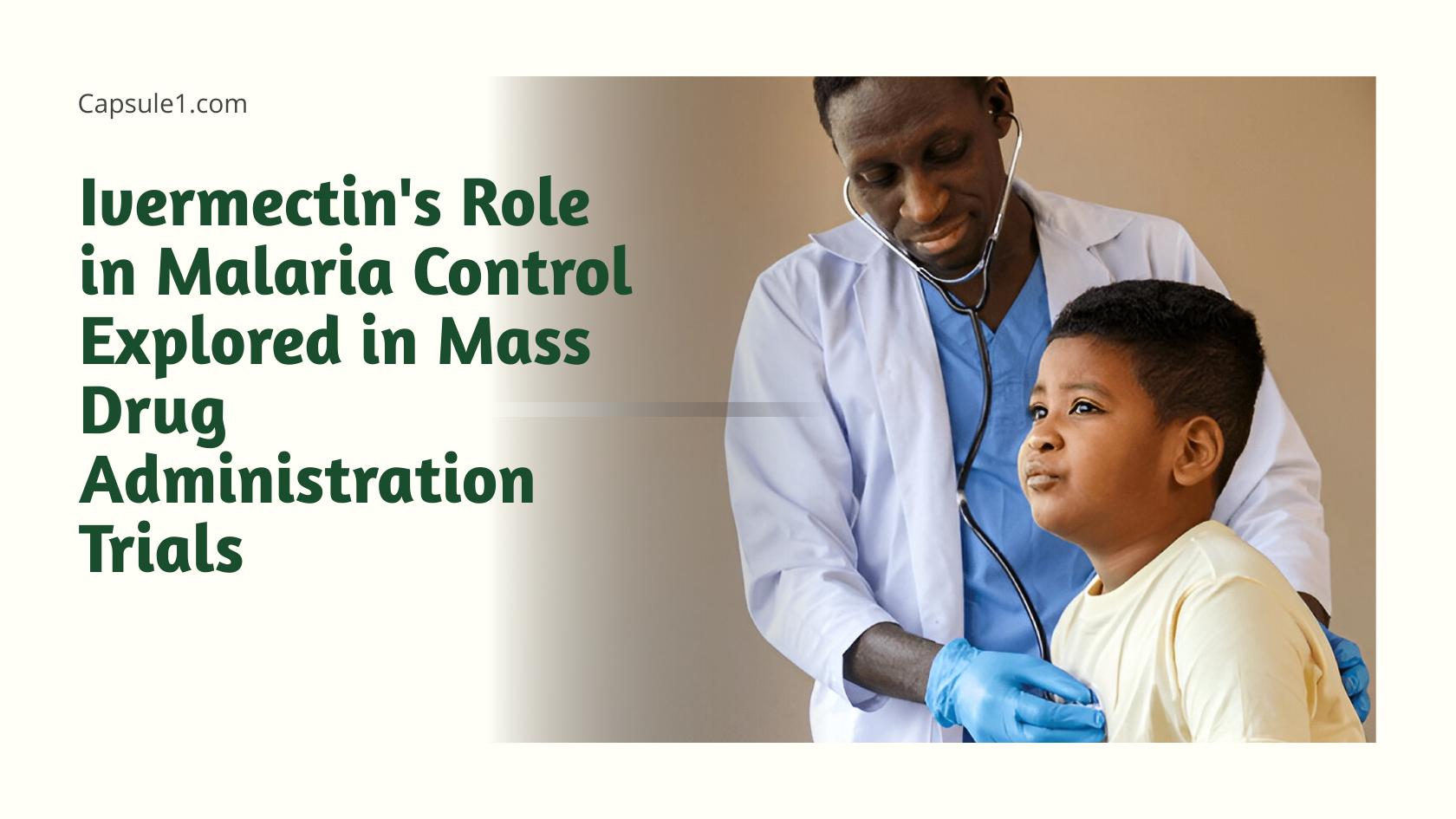Ivermectin's Role in Malaria Control Explored in Mass Drug Administration Trials

Malaria remains one of the world's most persistent public health challenges, particularly in tropical and subtropical regions. Despite decades of effort and numerous control strategies, the disease still claims hundreds of thousands of lives annually. However, recent innovations in vector control have sparked hope for more effective malaria reduction. One promising approach involves the use of ivermectin — a well-known antiparasitic drug — in mass drug administration (MDA) programs targeting mosquito populations.
This blog explores ivermectin's emerging role in malaria control through WHO-backed MDA trials, its impact on mosquito lifespans, the logistical challenges of delivery, ethical considerations, and the collaborative global health efforts driving these initiatives forward.
🌍 WHO-Backed MDA Trials: The Global Push for Malaria Vector Control
The World Health Organization (WHO) has endorsed a series of innovative vector control methods to supplement traditional malaria prevention techniques like insecticide-treated nets and indoor spraying. Among these, the use of ivermectin in mass drug administration ivermectin programs is gaining traction.
What Are MDA Trials?
Mass drug administration involves providing entire at-risk populations with a medication, regardless of individual infection status, to reduce disease transmission. In the case of malaria, ivermectin is administered to humans to indirectly affect mosquitoes that feed on treated individuals.
- The WHO malaria strategies 2025 include integrating ivermectin into vector control as a complementary tool.
- Multiple large-scale trials are currently underway in malaria-endemic countries in Africa and Southeast Asia.
- These trials aim to assess ivermectin’s safety, effectiveness, and feasibility as a community-wide intervention.
Goals of the Trials
- Reduce mosquito survival rates by exposing them to ivermectin in human blood.
- Interrupt the transmission cycle of malaria parasites.
- Complement existing vector control methods to accelerate malaria elimination.
These pioneering trials represent a significant step in expanding the global toolkit for malaria control.
🦟 Impact on Mosquito Lifespan: A Game-Changer in Vector Control?
One of the primary reasons ivermectin shows promise in malaria control is its lethal effect on mosquitoes that bite treated individuals.
How Ivermectin Affects Mosquitoes
- Ivermectin acts as a neurotoxin in mosquitoes, shortening their lifespan when they ingest blood containing the drug.
- Studies show that after feeding on treated hosts, mosquito survival drops dramatically within days.
- Since the malaria parasite requires roughly 10-14 days to develop inside the mosquito before transmission, reducing mosquito lifespan effectively blocks the parasite’s lifecycle.
Evidence from Clinical Trials
- Recent trials demonstrate significant reductions in mosquito populations after MDA with ivermectin.
- These reductions correlate with decreased malaria transmission rates in communities.
- Doses such as Ivermectin 9 mg and Ivermectin 30 mg have been tested for safety and efficacy.
Advantages Over Traditional Methods
- Unlike insecticides that mosquitoes can develop resistance to, ivermectin targets mosquitoes via human hosts.
- This method can reach outdoor and early-biting mosquitoes that evade nets and sprays.
- It offers a complementary approach, potentially increasing the overall effectiveness of malaria control programs.
🚚 Delivery Logistics: Challenges and Innovations in Mass Distribution
Implementing large-scale MDA programs involves complex logistical hurdles, especially in remote or resource-limited settings.
Ensuring Access and Coverage
- Distributing ivermectin to entire populations requires robust supply chains and community engagement.
- Coordination with local health systems is vital to ensure adequate dosing and follow-up.
- Monitoring for adverse effects and maintaining public trust are critical components.
Dosage Considerations
- Different ivermectin formulations and dosages, such as Ivermectin 9 mg for adults and Ivermectin 30 mg for higher dose studies, are used based on trial protocols.
- Accurate dosing ensures efficacy while minimizing side effects.
Innovations Facilitating Delivery
- Mobile health units and telehealth platforms have improved reach into hard-to-access regions.
- Partnerships with global health organizations aid in funding, training, and infrastructure support.
- Real-time data collection helps track distribution and treatment outcomes.
Efficient delivery systems are key to maximizing ivermectin’s impact in malaria control efforts.
⚖️ Ethical Concerns: Balancing Public Health Benefits and Individual Rights
Mass drug administration programs, while promising, raise important ethical questions that must be carefully addressed.
Informed Consent and Autonomy
- Ensuring that individuals understand the benefits and risks of ivermectin treatment is essential.
- Voluntary participation and respect for individual autonomy must be prioritized.
- Community engagement and education help address misinformation and concerns.
Safety Monitoring
- Though ivermectin has an excellent safety profile, monitoring for adverse reactions in diverse populations remains a priority.
- Trials include rigorous pharmacovigilance and follow-up.
Equity and Access
- Equitable access to ivermectin in all at-risk communities is a fundamental ethical consideration.
- Special attention is given to vulnerable populations such as pregnant women, children, and the immunocompromised.
Addressing Potential Resistance
- The potential development of resistance in mosquitoes or parasites is monitored closely.
- Adaptive management strategies ensure sustainable use of ivermectin.
Balancing public health imperatives with respect for individual rights is vital for the success and acceptance of MDA programs.
🤝 Global Health Partnerships: Collaborative Efforts Driving Success
The advancement of ivermectin in malaria control is powered by a network of global partnerships.
Key Stakeholders
- The WHO provides strategic leadership, technical guidance, and facilitates international cooperation.
- Governments of malaria-endemic countries lead implementation and adaptation to local contexts.
- Non-governmental organizations, academic institutions, and pharmaceutical companies contribute research, funding, and logistics.
Role of Capsule1 Pharmacy
- For individual access to ivermectin products outside of MDA settings, Capsule1 Pharmacy offers quality-assured ivermectin formulations such as Ivermectin 9 mg and Ivermectin 30 mg.
- This ensures availability for targeted treatments while broader public health programs proceed.
Research and Innovation Hubs
- Collaborative research institutions conduct clinical trials and monitor outcomes.
- Innovations in vector biology and drug delivery inform next-generation interventions.
This multi-sectoral collaboration is critical to overcoming malaria’s global burden.
🔍 Conclusion: Ivermectin's Expanding Role in Malaria Vector Control
The exploration of ivermectin’s use in malaria vector control trials signals a promising new frontier in the fight against malaria. By leveraging the drug’s ability to reduce mosquito lifespans, mass drug administration ivermectin programs aim to disrupt malaria transmission cycles and save lives on a large scale.
Backed by the WHO and implemented through global partnerships, these trials tackle both logistical and ethical challenges to bring ivermectin’s benefits to malaria-endemic communities. As evidence grows supporting ivermectin’s effectiveness, it is poised to become an integral part of comprehensive mosquito control strategies worldwide.
For those interested in ivermectin for personal use or as part of ongoing treatment programs, Capsule1 Pharmacy provides reliable access to effective dosages like Ivermectin 9 mg and Ivermectin 30 mg, ensuring quality and safety.
Together, scientific innovation and global cooperation may finally tip the scales in the fight against malaria, improving health outcomes for millions.



